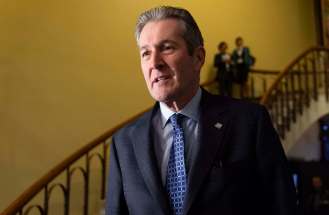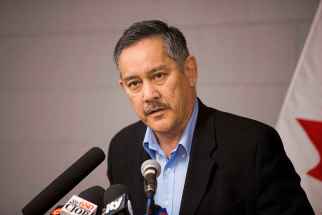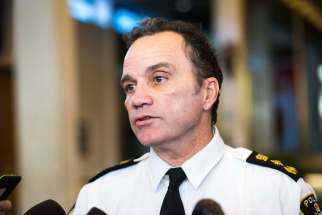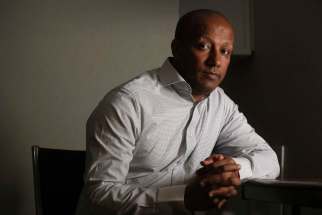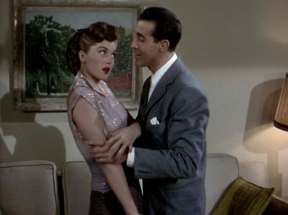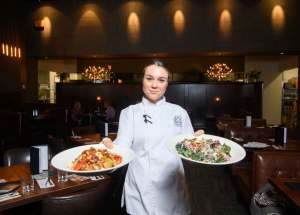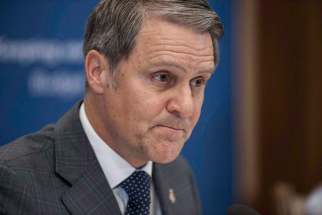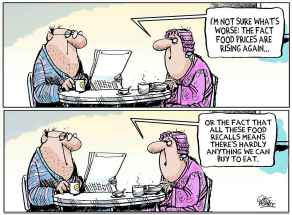Human rights, heartbreaking reality Winnipeggers who survived brutality and tragedy around the world – even in this country – share their stories on 70th anniversary of an international declaration of human rights
Read this article for free:
or
Already have an account? Log in here »
To continue reading, please subscribe:
Monthly Digital Subscription
$0 for the first 4 weeks*
- Enjoy unlimited reading on winnipegfreepress.com
- Read the E-Edition, our digital replica newspaper
- Access News Break, our award-winning app
- Play interactive puzzles
*No charge for 4 weeks then price increases to the regular rate of $19.00 plus GST every four weeks. Offer available to new and qualified returning subscribers only. Cancel any time.
Monthly Digital Subscription
$4.75/week*
- Enjoy unlimited reading on winnipegfreepress.com
- Read the E-Edition, our digital replica newspaper
- Access News Break, our award-winning app
- Play interactive puzzles
*Billed as $19 plus GST every four weeks. Cancel any time.
To continue reading, please subscribe:
Add Free Press access to your Brandon Sun subscription for only an additional
$1 for the first 4 weeks*
*Your next subscription payment will increase by $1.00 and you will be charged $16.99 plus GST for four weeks. After four weeks, your payment will increase to $23.99 plus GST every four weeks.
Read unlimited articles for free today:
or
Already have an account? Log in here »
Hey there, time traveller!
This article was published 07/12/2018 (2577 days ago), so information in it may no longer be current.
Seventy years ago, with the horrors of the Second World War, the Holocaust and the Holodomor on full display in the rear-view mirror, a consortium of lawmakers, government representatives, academics and ideologues gathered to draft a document they hoped would prevent any similar atrocities from happening again.
It was a bold vision, and the newly formed United Nations, which replaced the ineffective League of Nations, had high hopes for the document.
On Dec. 10, 1948, the Universal Declaration of Human Rights was proclaimed by the UN’s General Assembly. Within the declaration, 30 specific articles describing a variety of rights and freedoms were written, establishing a centralized framework the UN had determined was needed.
The Universal Declaration of Human Rights
Several of the articles in the declaration are named in this article. Read all 30 articles in the declaration here.
Article 1. All human beings are born free and equal in dignity and rights. They are endowed with reason and conscience and should act towards one another in a spirit of brotherhood.
Article 2. Everyone is entitled to all the rights and freedoms set forth in this Declaration, without distinction of any kind, such as race, colour, sex, language, religion, political or other opinion, national or social origin, property, birth or other status. Furthermore, no distinction shall be made on the basis of the political, jurisdictional or international status of the country or territory to which a person belongs, whether it be independent, trust, non-self-governing or under any other limitation of sovereignty.
Article 3. Everyone has the right to life, liberty and security of person.
Article 4. No one shall be held in slavery or servitude; slavery and the slave trade shall be prohibited in all their forms.
Article 5. No one shall be subjected to torture or to cruel, inhuman or degrading treatment or punishment.
Article 6. Everyone has the right to recognition everywhere as a person before the law.
Article 7. All are equal before the law and are entitled without any discrimination to equal protection of the law. All are entitled to equal protection against any discrimination in violation of this Declaration and against any incitement to such discrimination.
Article 8. Everyone has the right to an effective remedy by the competent national tribunals for acts violating the fundamental rights granted him by the constitution or by law.
Article 9. No one shall be subjected to arbitrary arrest, detention or exile.
Article 10. Everyone is entitled in full equality to a fair and public hearing by an independent and impartial tribunal, in the determination of his rights and obligations and of any criminal charge against him.
Article 11.
(1) Everyone charged with a penal offence has the right to be presumed innocent until proved guilty according to law in a public trial at which he has had all the guarantees necessary for his defence.
(2) No one shall be held guilty of any penal offence on account of any act or omission which did not constitute a penal offence, under national or international law, at the time when it was committed. Nor shall a heavier penalty be imposed than the one that was applicable at the time the penal offence was committed.
Article 12. No one shall be subjected to arbitrary interference with his privacy, family, home or correspondence, nor to attacks upon his honour and reputation. Everyone has the right to the protection of the law against such interference or attacks.
Article 13.
(1) Everyone has the right to freedom of movement and residence within the borders of each state.
(2) Everyone has the right to leave any country, including his own, and to return to his country.
Article 14.
(1) Everyone has the right to seek and to enjoy in other countries asylum from persecution.
(2) This right may not be invoked in the case of prosecutions genuinely arising from non-political crimes or from acts contrary to the purposes and principles of the United Nations.
Article 15.
(1) Everyone has the right to a nationality.
(2) No one shall be arbitrarily deprived of his nationality nor denied the right to change his nationality.
Article 16.
(1) Men and women of full age, without any limitation due to race, nationality or religion, have the right to marry and to found a family. They are entitled to equal rights as to marriage, during marriage and at its dissolution.
(2) Marriage shall be entered into only with the free and full consent of the intending spouses.
(3) The family is the natural and fundamental group unit of society and is entitled to protection by society and the State.
Article 17.
(1) Everyone has the right to own property alone as well as in association with others.
(2) No one shall be arbitrarily deprived of his property.
Article 18. Everyone has the right to freedom of thought, conscience and religion; this right includes freedom to change his religion or belief, and freedom, either alone or in community with others and in public or private, to manifest his religion or belief in teaching, practice, worship and observance.
Article 19. Everyone has the right to freedom of opinion and expression; this right includes freedom to hold opinions without interference and to seek, receive and impart information and ideas through any media and regardless of frontiers.
Article 20.
(1) Everyone has the right to freedom of peaceful assembly and association.
(2) No one may be compelled to belong to an association.
Article 21.
(1) Everyone has the right to take part in the government of his country, directly or through freely chosen representatives.
(2) Everyone has the right of equal access to public service in his country.
(3) The will of the people shall be the basis of the authority of government; this will shall be expressed in periodic and genuine elections which shall be by universal and equal suffrage and shall be held by secret vote or by equivalent free voting procedures.
Article 22. Everyone, as a member of society, has the right to social security and is entitled to realization, through national effort and international co-operation and in accordance with the organization and resources of each State, of the economic, social and cultural rights indispensable for his dignity and the free development of his personality.
Article 23.
(1) Everyone has the right to work, to free choice of employment, to just and favourable conditions of work and to protection against unemployment.
(2) Everyone, without any discrimination, has the right to equal pay for equal work.
(3) Everyone who works has the right to just and favourable remuneration ensuring for himself and his family an existence worthy of human dignity, and supplemented, if necessary, by other means of social protection.
(4) Everyone has the right to form and to join trade unions for the protection of his interests.
Article 24. Everyone has the right to rest and leisure, including reasonable limitation of working hours and periodic holidays with pay.
Article 25.
(1) Everyone has the right to a standard of living adequate for the health and well-being of himself and of his family, including food, clothing, housing and medical care and necessary social services, and the right to security in the event of unemployment, sickness, disability, widowhood, old age or other lack of livelihood in circumstances beyond his control.
(2) Motherhood and childhood are entitled to special care and assistance. All children, whether born in or out of wedlock, shall enjoy the same social protection.
Article 26.
(1) Everyone has the right to education. Education shall be free, at least in the elementary and fundamental stages. Elementary education shall be compulsory. Technical and professional education shall be made generally available and higher education shall be equally accessible to all on the basis of merit.
(2) Education shall be directed to the full development of the human personality and to the strengthening of respect for human rights and fundamental freedoms. It shall promote understanding, tolerance and friendship among all nations, racial or religious groups, and shall further the activities of the United Nations for the maintenance of peace.
(3) Parents have a prior right to choose the kind of education that shall be given to their children.
Article 27.
(1) Everyone has the right freely to participate in the cultural life of the community, to enjoy the arts and to share in scientific advancement and its benefits.
(2) Everyone has the right to the protection of the moral and material interests resulting from any scientific, literary or artistic production of which he is the author.
Article 28. Everyone is entitled to a social and international order in which the rights and freedoms set forth in this Declaration can be fully realized.
Article 29.
(1) Everyone has duties to the community in which alone the free and full development of his personality is possible.
(2) In the exercise of his rights and freedoms, everyone shall be subject only to such limitations as are determined by law solely for the purpose of securing due recognition and respect for the rights and freedoms of others and of meeting the just requirements of morality, public order and the general welfare in a democratic society.
(3) These rights and freedoms may in no case be exercised contrary to the purposes and principles of the United Nations.
Article 30. Nothing in this Declaration may be interpreted as implying for any State, group or person any right to engage in any activity or to perform any act aimed at the destruction of any of the rights and freedoms set forth herein.
It was a landmark accomplishment, but even the countries that voted in favour of the declaration routinely violated it then, and continued to violate it now.
In Canada, for example, although the right to a universal franchise is enshrined in the declaration, it took years before many groups were legally allowed to vote.
The declaration also proclaims the universal right of a standard of living adequate for the health and well-being of all people, including food; dozens of First Nations still lack running water, and many have water that is unsafe to drink.
It also stipulates a guarantee of equal work for equal pay, regardless of gender, race or sexual orientation, yet certain groups still earn considerably less than others.
Though seven decades have passed, there is still more to be done to protect those rights. Several Winnipeggers have a deep understanding of just how important that notion is.
Article 19: Freedom of opinion and expression
As a young man growing up in Ethiopia, Seid Ahmed dreamed of becoming a journalist.
He wanted to be a source of credible information for the public, to expose the unending stream of lies offered by the government. To tell citizens the whole truth, and nothing but.
After graduating from journalism school in the 1990s, Ahmed, 23 and brimming with potential, got his big break: a television reporting gig on ETV, a national network with millions of viewers.
There was just one problem; ETV was state-sponsored, and the government had final say on what made it to broadcast. More often than not, the truth fell to the cutting-room floor; if it managed to get past the censors, journalists risked being kidnapped, imprisoned, tortured and killed.
“Every single day ended with an argument with the editor-in-chief,” says Ahmed, who now works as a refugee response co-ordinator in Winnipeg. His work was censored as a matter of course. Some days his pieces didn’t make it to air.
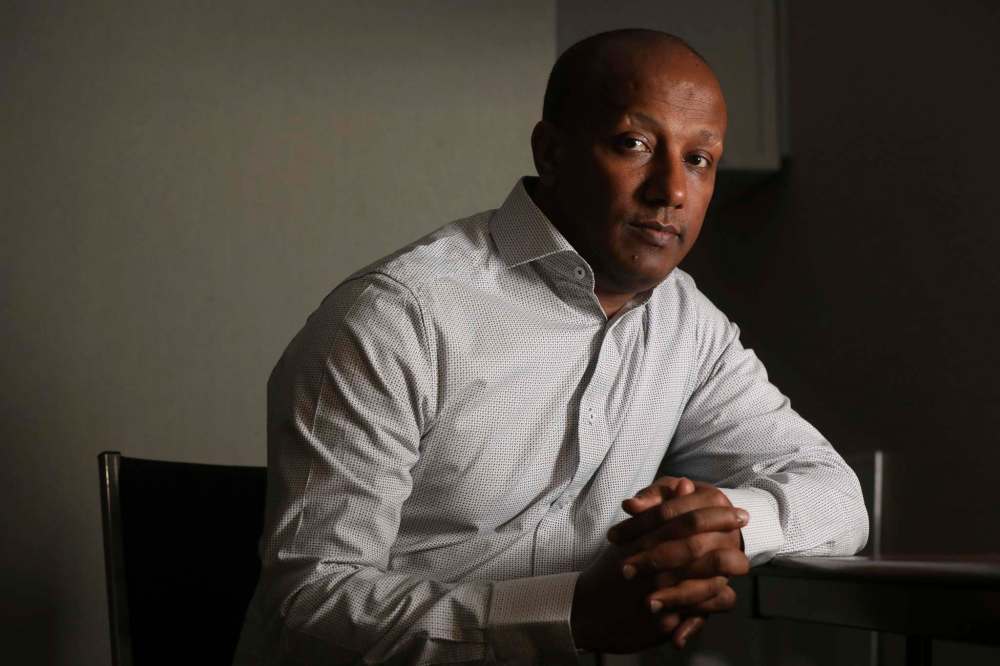
When his reporting included the opinions of government dissidents or critics, it was cut. An interview with an economist who criticized Ethiopia’s foreign investment policy? Gone. Footage of opposition members cheering? Not a chance.
Interviews with government officials were conducted by asking questions the same officials had approved ahead of time. Ahmed’s dream, it turned out, was nothing more than that.
Journalists across Ethiopia, including some who dared to work independently, were under constant threat. It wasn’t uncommon for reporters to be given a choice between resigning the jobs or going to prison, he says.
While covering the border conflict between Eritrea and Ethiopia in 2000, Ahmed got a tip from a friend who told him the government was going to arrest him because he “had a different agenda.”
Terrified, he decided to flee. As a television reporter, his face was well-known. If someone recognized him and tipped off the government, he was as good as done.
His fear was real. The state media prepared false stories about him, and his picture was distributed to various border checkpoints. At the Kenyan border, he bribed an immigration official, and after being granted entry, made his case to the United Nations High Commissioner for Refugees. Eventually, he was granted refugee status and arrived in Canada in 2003.
“I’m a news junkie. The truth is a very important thing to seek out. If you work as a journalist, your life will be defined by it.”
-Seid Ahmed
Ethiopia ranks 150th worldwide in press freedom. “There has been no significant improvement” since a series of purges in 2014 led to the closure of six newspapers and drove 30 journalists into exile, Reporters Without Borders says.
However, in 2019, UNESCO’s World Press Freedom Day will be held in the Ethiopian city of Addis Ababa. Ahmed says the country, under a new prime minister, seems to be making positive moves toward achieving the freedom of speech and media expression promised in the charter, but there’s still more work to be done.
Now 44 and the father of two young children, he says freedom of expression is a pillar of any democracy, and he continues to support all forms of media.
“I’m a news junkie,” he says. “The truth is a very important thing to seek out. If you work as a journalist, your life will be defined by it.”
He is among the lucky few who’ve lived to tell their own story.
Article 23: The right to work
Unlike most people, Ryan Morwick is always excited for Monday morning to come around.
For Morwick, Monday means waking up, getting dressed, making breakfast and hopping on the bus to the Asper Jewish Community Campus, where he’s worked as a cleaner for the last three years.
“One day, I said, ‘I really want to work at the Rady,” says Morwick, an eminently friendly and courteous 29 year old who loves floor hockey, basketball and french vanilla coffee. “I did it, and it makes me feel really proud.”
A part-time job might not seem like much, but 10 years ago, when Morwick was just starting with GROW Winnipeg — a life-skills development program for young adults living with intellectual and developmental disabilities — he wasn’t sure anyone would ever give him a shot.
“I didn’t think it was possible for me to get a job,” he says Monday morning after wrapping up his first shift of the week.
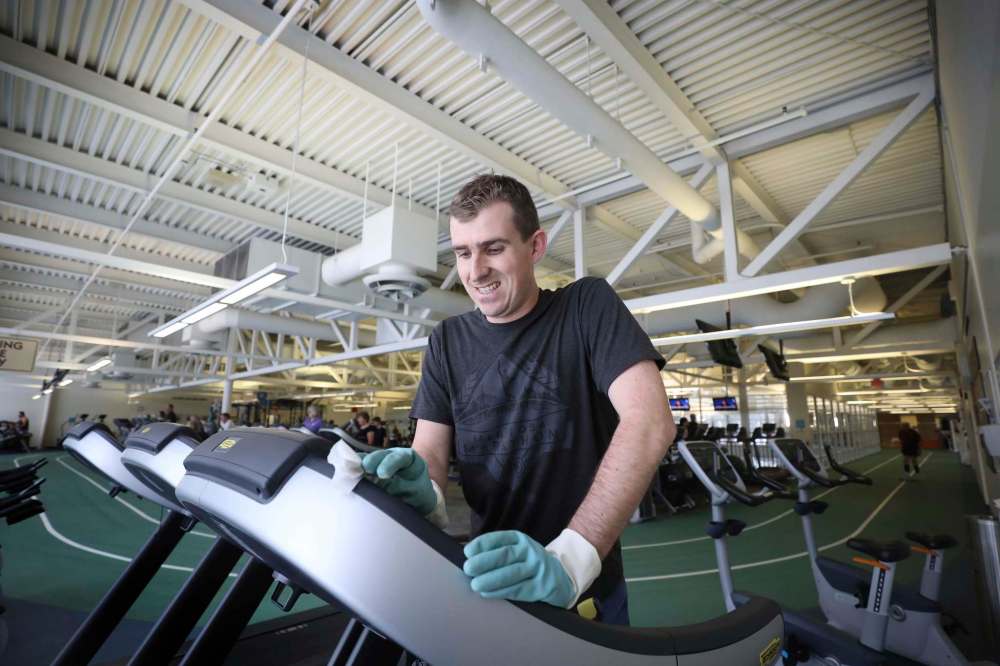
GROW, which stands for “Gaining Resources Our Way,” began in 2001 with a summer program in Gimli, aimed at developing necessary skills to gain independence. In 2009, it was expanded to fully subsidized Monday-Friday programming in Winnipeg, where participants — 16 currently — learn how to budget, cook, communicate and find their way around the city.
The organization’s mission is to enhance the potential of its participants and to provide opportunities for engagement in community life, including paid, fair employment. Morwick and his brother Riley were among the program’s first full-time participants.
Some potential employers have inaccurate views of people living with disabilities and their capabilities to work, says program director Sandy Sheegl. But if they can see past those misconceptions, they are rewarded with loyal, eager, dedicated people seeking meaningful employment.
“When employers have no expectations of someone as an employee, that person has nothing to live up to,” Sheegl says.
“Almost any work site has jobs that people with developmental or intellectual disabilities are capable of performing,” says Oly Backstrom, president and CEO of SCE Lifeworks Inc., an organization that supports people with intellectual disabilities to work and participate in the community. He says businesses are often reluctant to give jobs to that segment of the population, based on a general lack of awareness.
“I didn’t think it was possible for me to get a job.”
-Ryan Morwick
National statistics from 2012 show that while more than three-quarters of Manitobans without disabilities were employed, only 56 per cent with disabilities were in the workforce, Backstrom says, adding that 20 per cent gap represented more than 18,000 people capable of contributing who couldn’t find jobs.
“I feel some businesses are finally starting to understand and think more broadly about this untapped labour pool,” says Backstrom.
GROW participant Rachel Nickel, 25, knows what it’s like to be underestimated. In high school, a teacher told her she’d never be able to work with children because of her special needs. Now? She’s volunteering at Rady’s daycare facility, and has all the necessary certification needed for a full-time position.
Morwick, who lives in a condo with his brother, says seeing his friends succeed is just as important to him as his own achievements. “I’m so proud of everyone here,” he says.
“Ryan is a huge success story,” says Sheegl. “Once you build confidence in someone, it’s amazing what they do with it.”
Morwick enjoys what he does: cleaning, tidying up and organizing equipment around the gym facility. He’s a familiar face at the Rady, which is down the street from GROW’s offices, and loves to be a member of the team there.
“GROW and the Rady have given me so much,” he says. “Between the first day I showed up here and now… I just feel so proud of myself.”
And he gets paid fairly for his work. “That means I can buy more coffee,” he says with a laugh.
Article 25: The right to food, housing, medical treatment
Long before the day’s first wiener hit the flat-top grill, Will Gault already smelled of hot dogs — sweet, glorious hotdogs.
Gault, 41, has spent the last month doling out whistle dogs and foot-long franks with all of the fixings out of a kiosk — Willy Dogs — in the Deer Lodge Curling Club.
The chef had a banner year: in February, his daughter Ireland had successful cochlear implant surgery; in April, he began running a hotdog cart outside St. Boniface Hospital; in August, he married the love of his life; and in November, he took his spatula to the curling club.
Seven years ago, he was homeless, jobless and struggling with alcoholism and substance addiction.
“At certain points, I wasn’t sure I’d make it out alive,” he says.
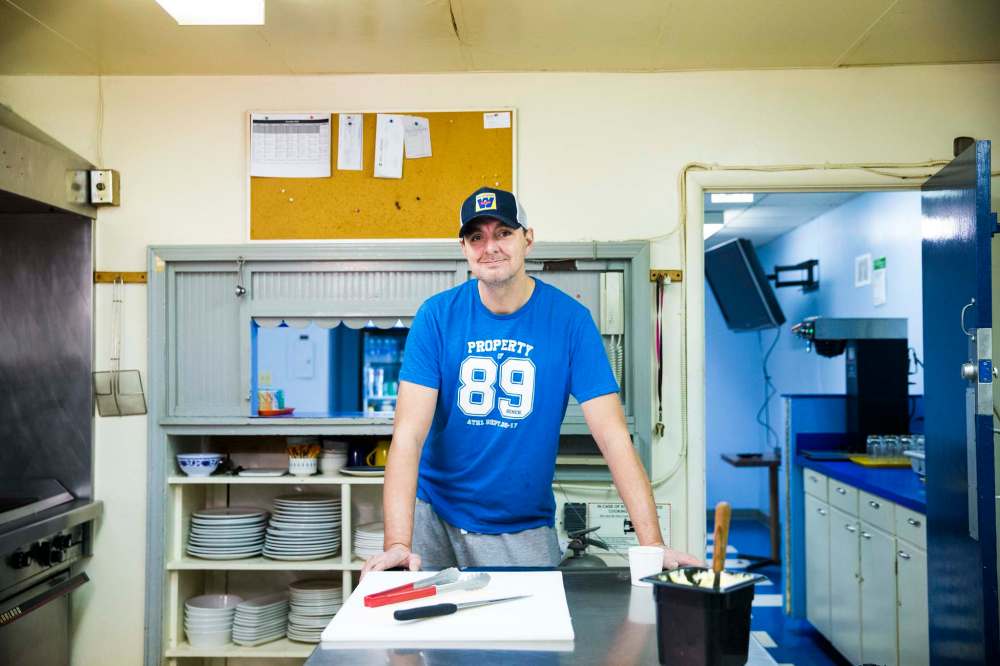
Before that, Gault was employed with the province as a peace officer, and had what he calls a good life. But beneath the surface, substance-abuse issues festered. A former partner kicked him out of their home and Gault found himself on the street. “All the doors were no longer open,” he recalls. “The couch was no longer available.”
His first night without a bed, Gault felt lost. It hit him that he had nowhere to eat, let alone sleep, and made his way to Siloam Mission. “They had one mat left,” he says. He spent a few weeks at the facility, accessing substance-management resources.
For a few years, he was in and out of treatment facilities and stable housing. He had a strong desire to get back to where he once was, but he began using harder drugs and his alcohol abuse became unbearable. It was a combination he feared would be his end.
A June 2015 seizure was the last straw. “I woke up the next day, and ever since then, I’ve been sober,” he says.
With the confidence he gained during his recovery, Gault met his now-wife, started a family with her and took the plunge and became a small-business owner.
“I feel like I have a purpose now. Before all this, I was just existing.”
-Will Gault
When he saw the curling club’s ad on Kijiji several weeks ago, he applied, believing it was offering a job as a line cook; he had no idea the club was looking for someone to run the kiosk.
But Brandon Cohoe, the club’s facility manager, was taken by Gault’s enthusiasm during the interview. Cohoe hired him without hesitation.
Gault has spent most his life working with food, starting out at 11 at Nibbler’s Nosh, where his sister ran the kitchen. He learned the ropes there, and by age 15, he’d become the kitchen supervisor at Elephant & Castle, a job he’d hold for three years. Food made sense to him, and having the opportunity to create his own menu and serve the club’s 700 members feels like a dream come true, a miracle, in some ways, especially after knowing what it’s like to be nowhere, with nothing.
“I feel like I have a purpose now,” he says. “Before all this, I was just existing.”
But Gault knows he’s been blessed, because Winnipeg lacks adequate detox and long-term recovery facilities and there’s a shortage of affordable housing. The current meth crisis has put even more pressure on available resources, he says.
“We need more access, we need longer access and we need to have more supports in place,” he says.
Gault and his wife are now looking to buy a house of their own after a few years living with her parents. He wants three bedrooms, a yard for Ireland to run around in —somewhere for her to make memories — and one other thing.
“I want a really big kitchen,” he says.
Article 2: Rights and freedoms without distinction of any kind, such as race, colour, sex, language, religion, political or other opinion, national or social origin, property, birth or other status
Alexa Potashnik is always listening to the conversations around her, but sometimes the silence is deafening.
That was the case in 2016, when seemingly every other day an unarmed black man, woman, or child was making headlines not for how they lived, but for how they died — often by bullet, often by cop.
Potashnik, then a 23-year-old human rights major at the University of Winnipeg, was understandably distraught. These were not isolated cases, nor were they stand-alone tragedies precipitated by errors in judgment; they were deaths made possible by long-standing systems sustained by racism — and nobody around her was talking about it.
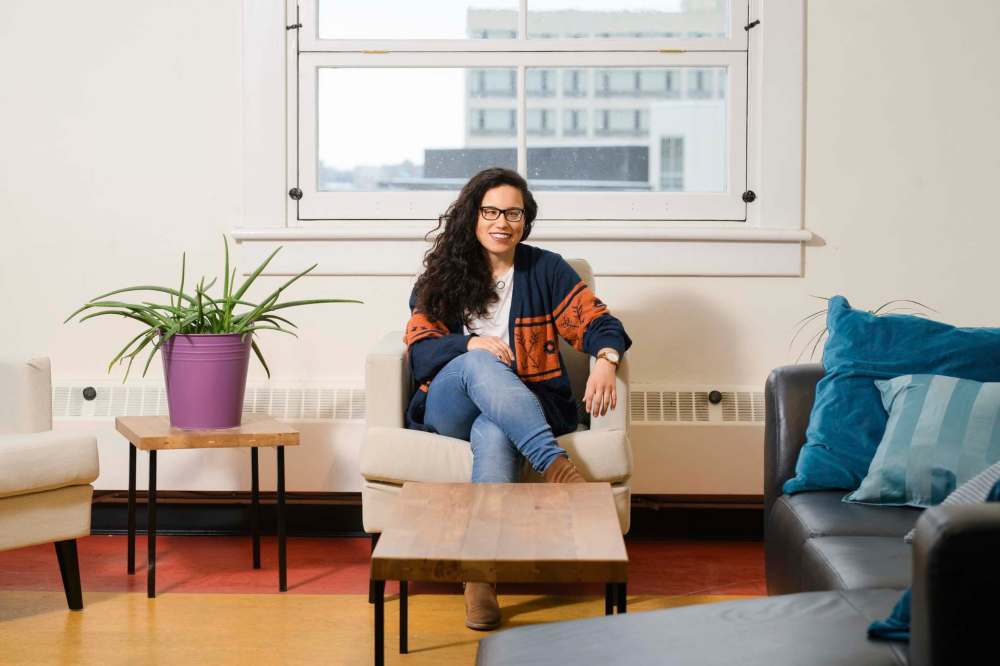
So Potashnik logged onto Facebook, where most of her local connections failed to share in her outrage, and created a private group intended to serve as a place for other black people in her circle and in the city to heal and take collective action.
In July, that group held a public rally called Not Another Hashtag: Black Lives Matter, a statement saying that the people killed were worth more than a social media post. About 1,000 people showed up, including allies.
When people got together, they got louder. Potashnik was finally able to hear something.
Out of that group, Potashnik sowed the seeds for Black Space Winnipeg, a grassroots movement dedicated to advocating for the city’s black community, drawing on the work of activists who came before her to find the movement’s vision.
Soon, the group began holding events, like Nuit Noir, its own spin on Nuit Blanche, the annual art event.
A film festival focused on advancing the work of pioneering and contemporary black filmmakers soon followed. Project Heal, a mental-health initiative aimed at limiting the strain and trauma caused by racism and white supremacy, came too.
“I just really want to get everyone in our community more access to what we’ve been lacking, which are resources and representation in all sectors across the city,” Potashnik says at an Exchange District coffee shop.
“I like to feel I’ve helped, but sometimes, I feel I’m not doing enough.”
She started out in business school, but two years into her degree she realized she wasn’t as passionate or as engaged as she ought to have been.
Potashnik discovered it was possible to earn a degree in human rights and seized the opportunity. But she quickly found the curriculum didn’t include some histories and narratives and offered only passing mention of human rights violations that were of particular interest to her — the Trans-Atlantic slave trade, mass incarceration, the entire Black Lives Matter movement — all pieces of the same puzzle she’s now trying to put together.
“In my degree, we never spoke about BLM, and I thought that was insane,” she says. “You can’t talk about human rights without talking about what’s going on right now.”
"I see way too many people sugar-coating things and making their views on racism palatable, digestible. But that’s not how change is achieved. It comes with revolutions."-Alexa Potashnik
A major goal for Potashnik and Black Space is to work at an institutional level to insert more black history in local classrooms.
“In Canada, I do feel people are more hesitant to discuss racism in all forms because we’re under the veil of multiculturalism,” she says.
“If and when our society gets to a place where we can talk about the roots of racism and the institutional implications of it, then we’ll be able to take a step forward.”
“There is a long way to go,” she adds, before discussing her hero, Malcolm X. “He was unapologetic about his views, and that’s what we need. I see way too many people sugar-coating things and making their views on racism palatable, digestible.
“But that’s not how change is achieved. It comes with revolutions.”
Article 18: Freedom of religion
“Auschwitz—have you heard of it?” asks 90-year-old Saul Spitz.
In 1944, when he was only 15, Spitz and his family were forced by the Nazis to leave their Hungarian community of Mad, and were shepherded into a ghetto in a provincial capital.
Weeks later, they were shipped to the Nazi death camp in Poland, where more than one million Jews, Roma, political dissidents, blacks and homosexuals, among other persecuted groups, were murdered.
To this day, more than three-quarters of a century later, Spitz still remembers his arrival. He remembers the two lines that formed. He remembers seeing Dr. Josef Mengele, the camp’s infamous Angel of Death. He remembers standing in one line, his father and brother in the other.
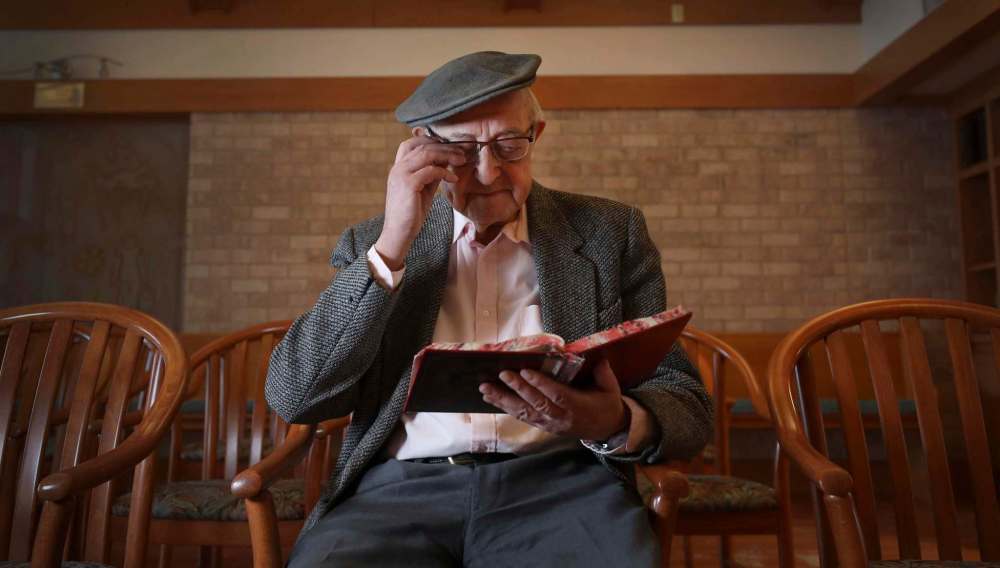
Spitz didn’t know what awaited when he got to the front of the line, but he simply wanted to be with his family. So, he darted quickly to the opposing column.
“Thank God I did,” he says in his room at a largely Jewish care centre after finishing his Tehillim, the daily scriptures he reads each morning. “If I didn’t, I’d have gone straight to the crematorium.”
Before the Holocaust — in which at least six million Jews and 11 million people in total were murdered by the Nazis in a systematic plot for Aryan supremacy — Spitz was an average Hungarian Jew. He learned to read Hebrew at the age of five, and learned the other traditions, too: how to read the Torah, how to daven (pray) and had his bar mitzvah when he turned 13.
He wasn’t ultra-religious, but Judaism mattered to him. When the Nazis arrived, his religion marked him as less than human, something to be exterminated.
For Regine Frankel who, along with her brother George and sister Rachel, formed a renowned musical trio in their youth, most of the Second World War was spent hiding in the French countryside.
Though many Jews in her hometown had become assimilated and secularized in the years prior to the Nazi occupation of France, Frankel’s family remained religiously devoted. When France fell, they were forced to live in a small shack on the property of a kind old woman who took them in.
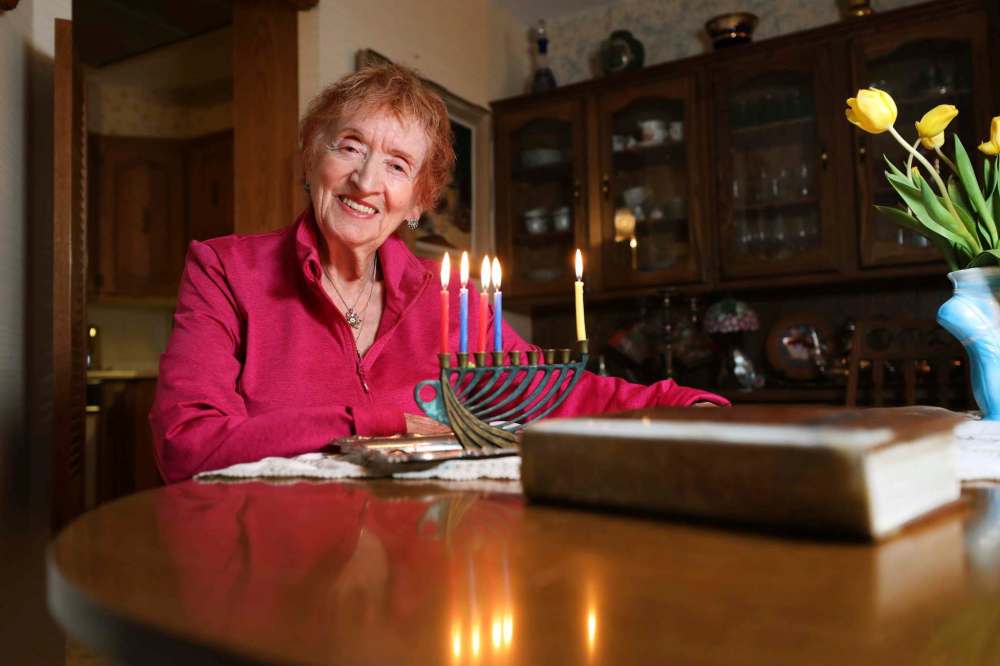
Every day, Frankel’s family feared they’d be discovered. There were constant whispers of a Nazi official’s impending arrival, making it dangerous to perform any religious custom.
Frankel remembers everything with great clarity, but one thing that’s stuck for more than 70 years is when her father — without his prayer book — recounted from memory the story of Exodus on the first night of Passover while her mother held a candle.
“He told it so softly,” she says. “His spirit was never broken, and he wouldn’t allow for ours to break, either.”
"I still am hoping for the best. I still pray. I still believe. You cannot ever take that away."-Saul Spitz
Frankel, her siblings and her parents all survived. She made her way to Canada, as did Spitz after he was liberated from a German labour camp. Spitz was only 20 when the Canadian Jewish Congress brought him to Winnipeg, and he settled in the North End, where he lived until recently. Every morning — through thundershowers, heat waves and blizzards — Spitz walked to the synagogue, carrying his prayer book behind his back.
The loss of his freedom of religion in Europe drove him to dedicate his life to it in Canada. Even at 90, he still reads his prayers every morning at about 7 a.m. He maintains a kosher diet. He thanks God every chance he gets.
Don Collerman-Elias, the spiritual health provider at the care home, says Spitz’s commitment to his faith is remarkable.
“He had every reason to stop believing, and to hide that part of himself,” Collerman-Elias says. “His experience in the war didn’t weaken his faith. In some ways, it made it stronger.”
“I still believe in God,” Spitz says. “I still am hoping for the best. I still pray. I still believe. You cannot ever take that away.”
Article 26: Right to education
When the black Chevy pulled up, Gerry Shingoose was excited.
She’d never seen a car before, let alone taken for a ride in one, so the five-year-old girl was intrigued.
Her siblings, George and Darlene, then seven and nine, had already taken the trip Gerry was about to embark on and were noticeably upset. “I had never seen anything like it,” Shingoose says.
“But I could feel the quietness coming from George and Darlene. They knew what was coming.”
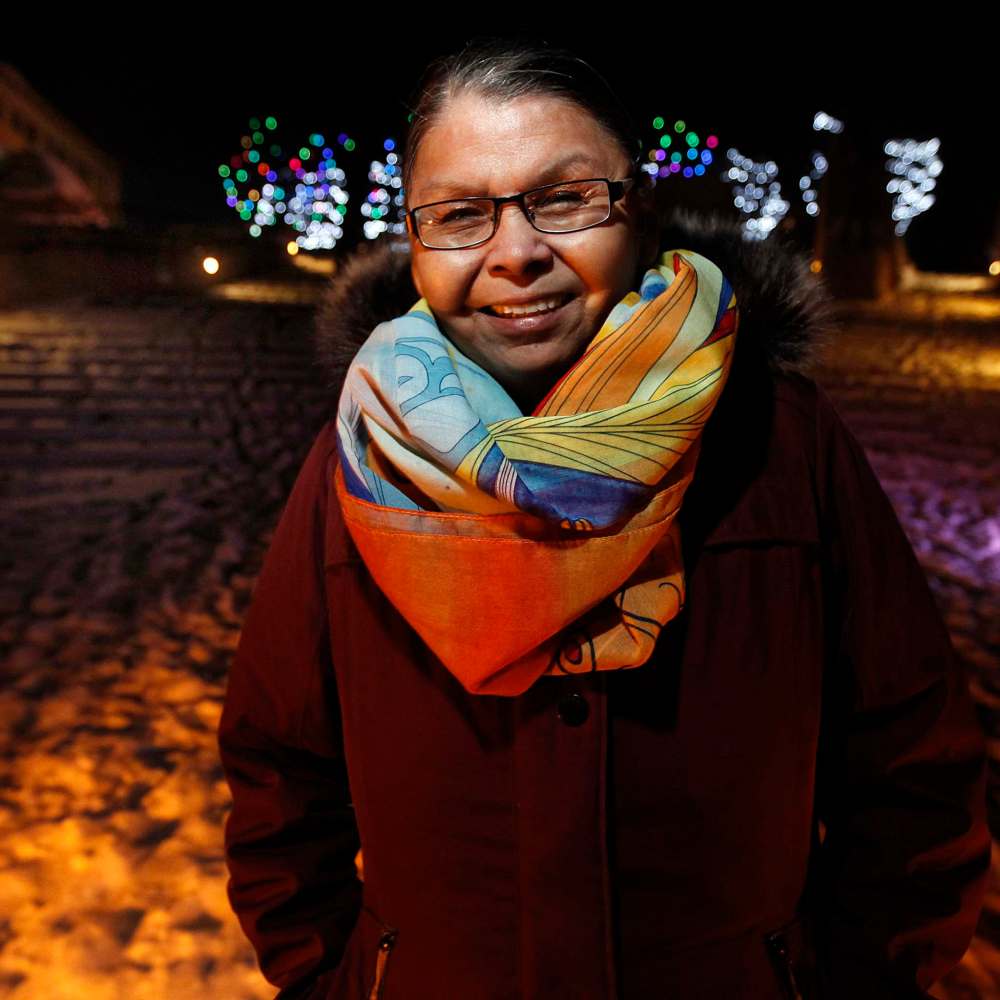
Soon, the children arrived at Muscowequan Residential School, greeted by stern nuns who struck fear into Gerry. George went to the boys’ dormitory and Gerry and Darlene were taken to the girls’.
“In the stairway, I could hear the girls crying,” Shingoose recalls. “I’d never heard that before.”
Frightened, she turned to her sister, speaking in Saulteaux and growing inconsolable. A nun — clad in a habit and with a cross dangling around her neck — yelled at her to quiet down. Shingoose didn’t know English, so she kept talking. The nun struck her across the mouth.
“I’d never seen that before,” she says. “Anger.”
Before being taken to residential school, Shingoose’s life was idyllic. She was raised on Treaty 4 territory, outside Hudson Bay, Sask., speaking only Saulteaux and living off the land with her parents, Henry and Eva, her kookum (grandmother) Annie Paul, and her siblings.
With her family, she picked berries from the Saskatchewan bush, learned to hunt and trap, told stories. Her parents and kookum were caring, funny and hard-working.
“It was a happy time, and my life was beautiful,” she says.
“They were setting the foundation,” she adds. “Because they were preparing me for what was to come.”
"Now is the time to create bridges without giving up who we are as Indigenous people."-Laara Fitznor
For more than a century, the federal government plucked Indigenous children from their parents and families, taking them to residential schools and robbing them of their culture and language, safety and well-being. The last of the facilities remained in operation until 1996; it took until 2008 for the federal government to issue a statement of apology for perpetrating what is widely acknowledged to be a genocidal act.
At Muscowequan, Shingoose lost more than she can describe. “They broke the sacred bond between me and my parents, grandparents and siblings,” she says. “They took it all away.”
Once, when she returned home, she asked her mother where her kookum was. She’d died weeks before. Nobody at the school told her, and she was devastated.
Although the Universal Declaration of Human Rights includes several guarantees of education, including the prior right of parents to choose the kind of education given to their children, no such consideration was given for Indigenous people in Canada.
“My parents probably never even knew they had that rights,” Shingoose says. “The document didn’t include Indigenous people. My parents had that right but they were never given it.”
Group seeks human rights designation for city
Despite documentation signed by countries worldwide imploring human rights for all, there are still gross violations everywhere: in Yemen, in Russia, in Winnipeg. It’s those violations that spurred the formation of Manitobans for Human Rights, says Valerie Thompson, the president of the relatively new non-profit, non-partisan advocacy group.
Despite documentation signed by countries worldwide imploring human rights for all, there are still gross violations everywhere: in Yemen, in Russia, in Winnipeg.
It’s those violations that spurred the formation of Manitobans for Human Rights, says Valerie Thompson, the president of the relatively new non-profit, non-partisan advocacy group.
Thompson, a former social worker, says the organization is working to develop 12 sub-committees representing different groups of people in Winnipeg who still lack basic human rights‚ including Indigenous people, LGBTTQ people, people experiencing poverty and homeless, and people with disabilities. Serving on these committees are professionals, academics, front-line workers, and people with lived experiences.
“In many ways, people are working toward the same goals,” Thompson says. “We’re hoping to bring together people working on different human rights issues to share their stories with each other so we all have a more complete understanding of their needs.”
That way, Thompson says, people working on certain issues can draw on the total collection of resources and contacts rather than just their own. In all, Manitobans for Human Rights has a network of over 600 connections, she says.
One overarching goal for the organization is for Winnipeg to be designated as a human rights city, a concept that roughly means all levels of government and institutions instil and promote human rights as a value within their frameworks. As it is, Thompson says not enough people are aware of their rights, nor that a document like the Universal Declaration of Human Rights even exists.
“People are graduating from university and high school without ever hearing of it,” she says.
In addition to holding events, including one on Dec. 9 at the Norwood Community Centre to celebrate Human Rights Day, the organization is hoping to ramp up educational efforts so people are able to understand and access the rights they’re guaranteed.
To Thompson, such a movement makes sense. With the success of the Canadian Museum for Human Rights, she says getting a human rights designation for the city should be a no-brainer.
“We want people to be more aware, and to see where there are still violations and things that need to be done,” she says.
And there are plenty of those, she says, pointing to the meth crisis, the ongoing poverty and homelessness issues, and a widespread mental health and substance abuse crisis. But there are glimmers of hope, too, like the many people doing grassroots work to address those issues and to advocate for change.
“At least we have a place to start,” she says.
Laara Fitznor, a professor in the faculty of education at the University of Manitoba, agrees that was the case.
“Human rights for Indigenous people have always been compromised,” she says. “We’re always having to fight for them, advocate for them and defend them every step of the way.”
Fitznor points to the United Nations Declaration on the Rights of Indigenous Peoples as a positive progression over the UDHR, but Canada adopted it nearly a decade after the rest of the General Assembly, she says.
“It’s very easy for things to be done from a Eurocentric point of view within Canadian parameters, but many times that doesn’t include respect to how Indigenous people would like to do things.”
Fitznor says the education system has not done nearly enough to address Indigenous history and culture, largely excluding them from curriculums.
“We’ve been forced and expected to learn things your way,” she says. “Now is the time to create bridges without giving up who we are as Indigenous people.”
That’s what Shingoose is doing, too. Her children, grandchildren and great-grandchildren attended public schools, and she was inspired by the Truth and Reconciliation Commission to share her story with students, teachers and school administrators.
“Everyone has the right to an education and to see themselves reflected in the curriculum,” she says. “There is still a long way to go.”

Ben Waldman is a National Newspaper Award-nominated reporter on the Arts & Life desk at the Free Press. Born and raised in Winnipeg, Ben completed three internships with the Free Press while earning his degree at Ryerson University’s (now Toronto Metropolitan University’s) School of Journalism before joining the newsroom full-time in 2019. Read more about Ben.
Every piece of reporting Ben produces is reviewed by an editing team before it is posted online or published in print — part of the Free Press‘s tradition, since 1872, of producing reliable independent journalism. Read more about Free Press’s history and mandate, and learn how our newsroom operates.
Our newsroom depends on a growing audience of readers to power our journalism. If you are not a paid reader, please consider becoming a subscriber.
Our newsroom depends on its audience of readers to power our journalism. Thank you for your support.

